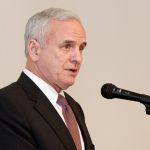Minnesota Gov. Mark Dayton collapsed Monday night in front of legislators while giving the State of the State address. Though he rebounded well, he just disclosed a recent prostate cancer diagnosis. Learn about the proper medical care that's needed when someone faints, and why it happens in the first place.
prostate cancer
A paper was recently published in Cancer on who, and why, patients seek second opinions on prostate cancer. Despite recommendations from both the National Cancer Institute and the American Cancer Society for cancer patients to seek second opinions regarding treatment, there is little substantive medical literature on the behavior surrounding this option.
Actor Ben Stiller recently chronicled how early diagnosis of prostate cancer, using a routine blood test, saved his life. And he's urging all men over 40 to discuss the PSA test with their doctor. However, we here at the Council and other organizations have been critical of it, so it's fitting that we review where science stands on the issue.
Prostate cancer can be indolent, not posing a risk to life — or aggressive, leading to an increased risk of death. A new analysis from the large EPIC study suggests that increases in BMI and waist circumference are associated with an increased risk of the aggressive form, and thus to an increased mortality risk.
A recent study, published online in the journal European Urology, reveals that men who had more frequent ejaculations had a statistically significant reduction in prostate cancer risk. Yes, we can almost hear the collective high-fives taking place among you guys right about now.
An op-ed in the NY Times co-authored by Dr. H. Gilbert Welch decries Medicare's proposal to penalize doctors for ordering the prostate screening tests. That seems like an odd sentiment to endorse, given that we here at the American Council believe that these tests are being given far too often.
A new study shows a strong association between androgen-deprivation therapy for advanced prostate cancer, and the development of Alzheimer's disease. This is a retrospective data-based study, so no change in treatment using ADT is indicated now. Further, prospective studies are needed.
Two studies show that fewer men have been screened for prostate cancer using the PSA test since 2012, when a federal panel advised against routine screenings. With doctors increasingly questioning the test's validity, that's a good thing. But the real key is whether reduction in PSA testing has led to a rise in late-stage or fatal prostate cancer.
A new blood test that detects prostate cancer may send PSA formerly the gold standard of detection to the scrap heap. Not only does it involve a blood sample, rather than a biopsy, but the test also detects the deadly, aggressive form of the disease that PSA can miss entirely.
Because of the 1994 Dietary Supplement Health and Education Act (DSHEA), dietary supplement purveyors can't claim that their products can prevent, treat or cure disease. So they have to resort to "support" verbiage. But we know what they really mean.
A news report says Republican presidential candidate Ben Carson was associated with a supplement maker, and actually took a regimen of products to treat his prostate cancer diagnosis. After hearing his dubious views on vaccines during the debates, this latest discovery makes us feel even more uncomfortable about his commitment to sound science.
Are women driven by anti-science beliefs for how they choose their breast cancer treatment? No. But the Memorial Sloan Kettering and the Wall Street Journal seem to think so. They are basing this on a deeply flawed study by the hospital's media staff.


